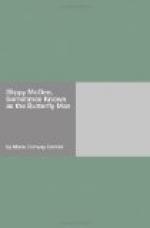“Sure we know,” said the Butterfly Man hastily. “Don’t you know you’re our kids and we’ve got to know?” He began to edge them towards the door. I think his courage was getting a little raw about the corners. “Yes, you two go on over to the Parish House parlor, where you’ll have a chance to talk without being interrupted—Madame will see to that—and don’t you show your noses outside of that room until everything’s settled the one and only way everything ought to be settled.” His eyes twinkled as he manoeuvered them outside, and then stood in the doorway to watch them walk away—beautiful, youthful, radiantly happy, and very close together, the girl’s head just on the level of the boy’s shoulder. He was still faintly smiling when he came back to us; if there was pain behind that smile, he concealed it. My mother ran to him, impulsively.
“John Flint!” said she, profoundly moved and earnest. “John Flint, the good God never gave me but one child, though I prayed for more. Often and often have I envied her silly mother Mary Virginia. But now. John, I know that if I could have had another child that, after Armand, I’d love best and respect most and be proudest of in this world, it would be you. Yes, you. John Flint, you are the best man, and the bravest and truest and most unselfish, and the finest gentleman, outside of my husband and my son, that I have ever known. What makes it all the more wonderful is that you’re a genius along with it. I am proud of you, and glad of you, and I admire and love you with all my heart. And I really wish you’d call me mother. You should have been born a De Rance!”
This, from my mother! I was amazed. Why, she would think she was flattering one of the seraphim if she had said to him, “You might have been a De Rance!”
“Madame!” stammered Flint, “why, Madame!”
“Oh, well, never mind, then. Let it go at Madame, since it would embarrass you to change. But I look upon you as my son, none the less. I claim you from this hour,” said she firmly, as one not to be gainsaid.
“I’m beginning to believe in fairy-stories,” said Flint. “The beggar comes home—and he isn’t a beggar at all, he’s a Prince. Because the Queen is his mother.”
My mother looked at him approvingly. The grace of his manner, and the unaffected feeling of his words, pleased her. But she said no more of what was in her heart for him. She fell back, as women do, upon the safe subject of housekeeping matters.
“I suppose,” she mused, “that those children will remain with us to-day? Yes, of course. Armand, we shall have the last of your great-grandfather’s wine. And I am going to send over for the judge. Let me see: shall I have time for a cake with frosting? H’m! Yes, I think so. Or would you prefer wine jelly with whipped cream, John?”
He considered gravely, one hand on his hip, the other stroking his beard.
“Couldn’t we have both!” he wondered hopefully. “Please! Just for this once?”




